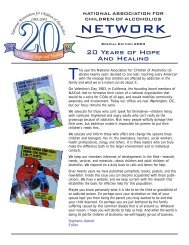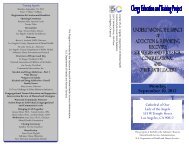Contents - NACoA
Contents - NACoA
Contents - NACoA
Create successful ePaper yourself
Turn your PDF publications into a flip-book with our unique Google optimized e-Paper software.
A Message to Early Childhood Professionals<br />
You are in a unique position to make a significant contribution in the lives of<br />
children with alcoholic parents. The many hours you spend caring for these children<br />
can have a profound effect on the quality of their lives—now, and in the future.<br />
The National Association for Children of Alcoholics (<strong>NACoA</strong>) has assembled this<br />
kit to help you learn more about the disease of alcoholism and its effects on children of<br />
alcoholic parents. We want you to have the opportunity to touch these young lives in the<br />
best way possible. This kit—the fifth in a series of publications for children of alcoholics<br />
and the professionals who work with them—contains resources others have found to be<br />
helpful. As you read these materials, keep these things in mind:<br />
Millions of Americans are problem<br />
drinkers or suffer from<br />
the disease of alcoholism. One<br />
in four children in the United<br />
States is growing up in a home<br />
where alcohol abuse or alcoholism<br />
is affecting their lives.<br />
Countless others have parents<br />
who are addicted to other drugs.<br />
Many research studies suggest<br />
that the children of alcohol- and<br />
other drug-dependent parents<br />
are at a great risk for problems<br />
later in life. Children of alcoholics<br />
grow up to become parents<br />
who, if not helped, often carry the<br />
sorrow and uncertainty of their<br />
own childhoods with them.<br />
Alcoholism is a family disease. It<br />
affects all children in an alcoholic<br />
home environment, but some of<br />
them are able to bounce back and<br />
learn to cope with life’s difficulties,<br />
especially if they are given a<br />
little help. Often that help must<br />
come from outside the family. As<br />
caregivers, we can help children<br />
to become more resilient.<br />
Learning about alcoholism and<br />
how it affects family members,<br />
and then discovering resources<br />
in your community to help families<br />
cope with alcohol-related<br />
problems, are good beginning<br />
steps. Armed with knowledge<br />
and information about alcoholism,<br />
and the resources with<br />
which to address it, you can help<br />
reduce the risks of future problems<br />
in children from alcoholic<br />
homes—and help reduce the<br />
confusion and fear they feel now.





